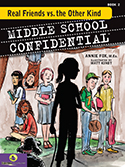February 2007
Show Us the Love, OK?
by Annie Fox, M.Ed

Countdown to Valentine’s Day and already we’re feeling the love around here. One recent night I went to bed early while David paid the bills and wrote up last minute instructions for the house sitter. Not romantic enough for you? Wait, it gets better. The next morning, while David slept in, I made pancakes. While he cleaned up after breakfast, I vacuumed. While I gave the dog a much-needed flea bath, he did the laundry. Still doesn’t make you feel all warm and tingly? To each his own, but in my book, all of this spells L-O-V-E, especially since we were leaving for Tokyo the next day and mutual support is what our 32-year partnership is all about.
 Someone once said, “Taking turns is the lowest form of cooperation.” They got that right. Something’s
mixed-up when lovers resort to “I emptied the litter box last week, so it’s your turn!” Where’s
the love in keeping score like that? Individuals in the most successful partnerships are tuned into each other’s
strengths and weaknesses. They communicate openly. They do what needs to be done regardless of whose “turn” it
is. Likewise, the partnership that is the family demonstrates love by respecting the needs of the individual members
while supporting the well-being of the entire family.
Someone once said, “Taking turns is the lowest form of cooperation.” They got that right. Something’s
mixed-up when lovers resort to “I emptied the litter box last week, so it’s your turn!” Where’s
the love in keeping score like that? Individuals in the most successful partnerships are tuned into each other’s
strengths and weaknesses. They communicate openly. They do what needs to be done regardless of whose “turn” it
is. Likewise, the partnership that is the family demonstrates love by respecting the needs of the individual members
while supporting the well-being of the entire family.
Your ability to love someone else is directly proportional to your ability to love and respect yourself. That said, no one’s suggesting that you replace turn taking with martyrdom. Acting the doormat doesn’t serve your partnership, your personal development or the development of your kids. If you feel resentful because others slack off while you lift, fetch, and carry then speak up. Sometimes we need reminding that we’re a family and that makes us part of a team.
 When you consistently model cooperation and partnership with your spouse or significant other, that’s what
you’ll get from the kids you live with. What’s that you say? Your tweens and teens aren’t into
household chores? Then you need to educate them. But only do that if you’re serious about helping them to become
fully functioning adults. That would include learning to pitch in and clean up after themselves. (Useful life-skills,
right?) It also requires abandoning the idea that lending a hand is a choice. It’s not a choice. It’s
a privilege and a requirement for being part of the family. When helping out is presented as a request rather than
a clear expectation, kids are likely to pass. So quit asking for their help!
When you consistently model cooperation and partnership with your spouse or significant other, that’s what
you’ll get from the kids you live with. What’s that you say? Your tweens and teens aren’t into
household chores? Then you need to educate them. But only do that if you’re serious about helping them to become
fully functioning adults. That would include learning to pitch in and clean up after themselves. (Useful life-skills,
right?) It also requires abandoning the idea that lending a hand is a choice. It’s not a choice. It’s
a privilege and a requirement for being part of the family. When helping out is presented as a request rather than
a clear expectation, kids are likely to pass. So quit asking for their help!
When our kids were little, I read a parenting book that said: “Never ask a young child a question that can be answered with ‘No!’” It was so simple and so brilliant I completely forgot it and once foolishly asked my 4 year old son, “Would you like to put away your toys now, please?”
“No thanks, Mom.” he answered. “That’s just not any fun for me.”
“Do you think picking up your toys is fun for me?” I asked, dumbfounded.
He nodded.
Ohmigod! I had taught my son that there’s no reason to do something if it’s not fun. Simultaneously I’d failed to teach him that helping out whenever help is needed is a constructive way to show our love and compassion for each other.
Don’t make the same mistake I did. If you want your kids to embrace the family partnership of love, stop asking them whether they want to help. Call a family meeting. Talk about how you’ve been feeling vis-à-vis chores. Talk about the mistakes you’ve made in teaching them about helping out around the house. Outline the new changes in policy. Get their input about how to make sure there’s “fairness” built into the new policy. Then adjourn and get started.
 The next time you need a hand from your son or daughter, give a clear directive. And while you’re at it, watch
your use of the word “OK.” As simple as that word is, teens consistently misunderstand it. When you say
to your 13 year old, “I want you to pick up all these dirty clothes and bring them down to the laundry, OK?” To
you, “OK?” probably means: “Did you get that?” But to your teen “OK?” means: “Is
that okay with you?” “Well, actually, no, Dad, I’d rather not.” So lose the “OK” at
the end of your directives and you’ll probably get more cooperation. No guarantees, but it’s a baby step
in the right direction.
The next time you need a hand from your son or daughter, give a clear directive. And while you’re at it, watch
your use of the word “OK.” As simple as that word is, teens consistently misunderstand it. When you say
to your 13 year old, “I want you to pick up all these dirty clothes and bring them down to the laundry, OK?” To
you, “OK?” probably means: “Did you get that?” But to your teen “OK?” means: “Is
that okay with you?” “Well, actually, no, Dad, I’d rather not.” So lose the “OK” at
the end of your directives and you’ll probably get more cooperation. No guarantees, but it’s a baby step
in the right direction.
Solid partnerships between parents and kids help strengthen families. Only good things come when everyone on the
team works together to achieve shared goals. All family goals are actually the same goal: We each do whatever
it takes to love, respect and support each other and to help the household run smoothly. When kids are part
of the partnership, they learn that they’re an integral part of the family. That makes them feel loved, and
competent. It increases their sense of belonging. It also teaches them that the spirit of partnership is  essential
to grown-up loving relationships.
essential
to grown-up loving relationships.
Happy Valentine’s to you and your family!
In friendship,
Annie
















